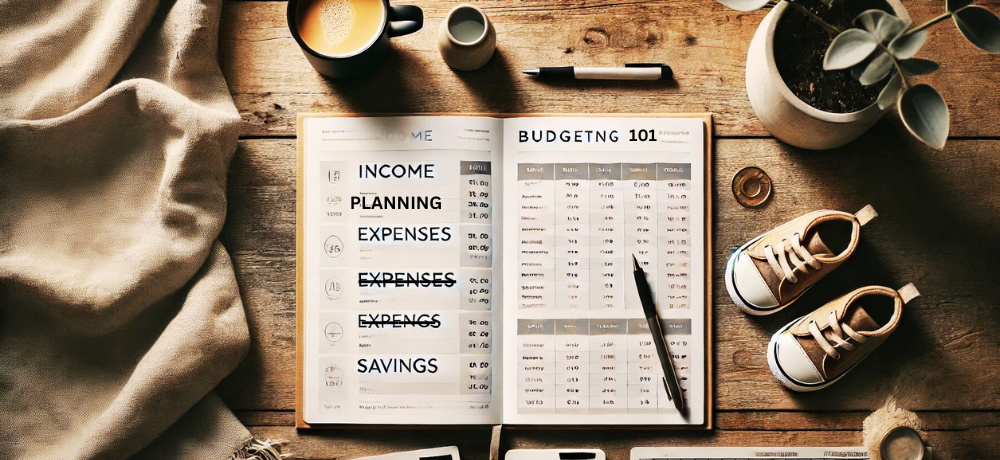
Making the move from a regular job to becoming a stay-at-home parent can stir up more than just your daily routine—it can seriously shake up your finances too.
It’s not just about saying goodbye to that paycheck; it’s about how this shift affects everything from your household budget to your health insurance.
Getting a clear picture of what these changes will look like is the first step in making this new chapter work for you and your family.
Without a steady income coming in, it’s time to really take a good, hard look at your finances.
How did money flow in and out of your household? And how will it look now? Your household budget is no longer just about keeping up with monthly bills—it’s your financial game plan.
So, grab a cup of coffee, pull up those bank statements, and start tracking where every dollar is going. You might find a few surprises along the way (and that’s okay!).

Building a New Family Budget: Planning for the Future
Next, don’t forget about the benefits that came with your old job—things like health insurance, retirement savings, and other perks. These can change dramatically when you leave your job, and understanding those shifts ahead of time is key.
Whether it’s exploring private insurance or looking into your partner’s benefits, it’s important to explore your options before you’re caught off guard.
Building a new family budget is like a mini crash course in financial planning. Think of it as your new financial map, helping you prioritize what needs to be covered each month and where you might be able to trim some fat.
This will give you a much clearer idea of what’s realistic for your family and what adjustments you might need to make. And don’t forget, this process should be a team effort—everyone in the family needs to be on the same page about how things are changing.
By taking the time to understand the financial impact upfront, you’ll be in a better position to tackle the challenges of stay-at-home parenting with confidence.
So, take a deep breath, sit down together, crunch the numbers, and figure out how this transition can flow smoothly into your family’s new rhythm.
Creating a Financial Game Plan: Essentials First
When you switch gears to stay home with the kids, it’s time to rethink how you handle money daily. Creating a solid financial plan isn’t just a smart move, it’s a must. This is your opportunity to take control, spot those sneaky expenses, and make sure every dollar is working for you.
First things first: get clear on what’s absolutely essential each month. Stuff like housing, groceries, and utilities should be at the top of the list. Then, take a look at the “extras”—those things you might not use as much as you thought. For instance, that forgotten subscription box or the gym membership that’s collecting dust.
This little exercise will help you identify where you can make cuts without feeling deprived.
Setting Goals, Side Hustles, and Savings: Building for the Future
Next up, setting goals.
Maybe you’re dreaming of a family vacation or just making it through the year without feeling financially stretched. Whatever your goals are, breaking them down into smaller, achievable steps makes them feel a lot more doable.
It’s not just about cutting back, it’s about smart, forward-thinking planning that sets you up for success down the road.
Have you considered picking up a little side hustle? Whether it’s gig work, online tutoring, or even starting a small business from home, having a flexible way to earn a bit of extra income can take some of the pressure off. It doesn’t need to be full-time or super lucrative—just enough to ease the financial squeeze without taking you away from your family too much.
And don’t forget about savings! Even if you can’t put away a huge amount each month, saving a little bit regularly adds up over time. Whether it’s for an emergency fund or that unexpected car repair, having a financial cushion will give you peace of mind.

Consider setting up an automatic transfer to a savings account, so it’s out of sight, out of mind—but always building toward your future.
Putting together a financial plan like this isn’t just about getting by, it’s about making sure your family’s needs are met while still planning for the future. Check-in with your plan regularly, adjust when you need to, and celebrate the small victories along the way.
Every step you take is a step toward a more secure and confident financial future.
Maximizing Resources and Reducing Household Spending
When you’re transitioning into the stay-at-home parent role, stretching your budget becomes both an art and a necessity. It’s all about making every dollar count and getting creative with how you spend.
Let’s dive into some practical tips to help you reduce household expenses without feeling deprived:
1. Start in the Kitchen
- Meal Planning & Bulk Buying: These are your budget-friendly best friends.
Plan your meals for the week, make a shopping list, and stick to it to avoid impulse buys.
Buying in bulk helps you save in the long run, especially for non-perishable items. - Cook in Batches: Make large portions of meals that can be eaten throughout the week, saving both time and money. Get creative with leftovers, what can you turn into something new?
- Use Apps to Organize: Grocery shopping apps can help you keep track of what you need and avoid buying things you don’t.
2. Tackle Utilities
- Energy-Efficient Changes: Switch to LED light bulbs, unplug devices when they’re not in use, and monitor your thermostat. Small tweaks can add up to big savings on your electric bill.
- Review Service Providers: Periodically check your service plans for electricity, gas, internet, and phone. Rates change, and you might be able to get a better deal by switching or negotiating.
3. Insurance Comparison
- Take some time to shop around for better rates on health, auto, and home insurance. A quick review can save you hundreds a year.
- Bundle Policies: Often, bundling multiple policies (like auto and home) with the same provider can lead to significant discounts.
4. Tap Into Community Resources
- Local Libraries and Community Centers: These are goldmines for free or low-cost activities.
Many libraries offer story hours, educational programs, or free e-books, while community centers often host family-friendly events. - Neighborly Sharing: Consider swapping childcare with a neighbor or pooling resources for bulk buying. It’s a great way to save money while building a sense of community.
5. Leverage Technology
- Budgeting Apps: There are plenty of free or low-cost apps that can help you track your spending and stay within budget. Some apps even send alerts when you’re about to overspend.
- Cheap Entertainment: Consider ditching cable for streaming services or checking out free e-books and audiobooks from your local library. You can also find tons of budget-friendly family activities online!
By using a little creativity and some savvy resourcefulness, you can keep your family’s lifestyle enjoyable while sticking to a leaner budget. It’s not just about cutting corners; it’s about making smart, intentional choices that work with your new lifestyle.
Emotional and Psychological Aspects of Financial Shifts: Navigating the Change with Compassion
Shifting to being a stay-at-home parent is more than just a financial change, it’s an emotional and psychological one too. Let’s face it: the stress, anxiety, and even guilt that often come with adjusting to a tighter budget are real.
And while it’s natural to feel overwhelmed, it’s important to acknowledge these emotions and face them head-on, rather than letting them fester.
1. Recognizing Your Value Beyond the Paycheck
First things first: Your worth and contribution to the household go far beyond financial numbers.
Parenting is a demanding, full-time job that requires immeasurable emotional labor, time, and effort. The work you do at home is every bit as important as any paycheck. It might help to remind yourself (and your partner) of this when financial pressure starts to feel heavy.
Your role is invaluable, and your family is richer for it—emotionally, even if the bank balance looks a little different.
When those feelings of guilt or frustration bubble up, it’s key to ground yourself in the bigger picture. You are investing in your family’s well-being, and that’s something money can’t measure.
Take pride in the work you’re doing, even if it doesn’t always show up on a paycheck.
2. Open Communication and Building Support Systems
Let’s be honest—money talk can be tough.
Financial stress can strain even the most solid relationships, but communication is your strongest tool in navigating this change together. Regularly check in with your partner about budgets, goals, and concerns. Don’t shy away from discussing financial worries, even when they feel uncomfortable.
The more honest and open the conversation, the stronger your partnership will be in tackling the challenges ahead.

If emotions run high or disagreements start to surface, don’t hesitate to seek professional help, whether it’s from a counselor or financial coach. Sometimes, just having someone neutral to guide the conversation can help both of you gain clarity and work through the tough spots without letting the tension build up.
And don’t forget about your support system.
Surround yourself with friends, family, or local community groups who understand what you’re going through. Sharing experiences, offering each other advice, and leaning on others for encouragement can help lift some of that emotional weight.
It’s easy to feel isolated during this transition, but you’re not alone. There’s a whole network of people who’ve been there or are currently walking the same path.
Final Thoughts: Finding Balance and Embracing the Journey
This financial and emotional shift isn’t easy, but it’s worth it.
As you navigate this transition, remember that it’s not just about adjusting your budget, it’s about adjusting your mindset. Be patient with yourself and give yourself grace during the inevitable bumps along the way.
Building a new lifestyle isn’t a sprint; it’s a marathon, and finding balance will take time.
By addressing the emotional side of financial changes with understanding and compassion, you’re not only setting yourself up for financial stability but also emotional well-being. It’s about making space for both the challenges and the rewards of this new chapter.
Embrace the journey, take one step at a time. And know that, with a little patience, this transition can be the foundation for a more fulfilling, stable, and connected life for you and your family.
I really appreciate the practical advice in this article about making the shift from employment to stay-at-home parenting. It’s such an important transition, and having a solid financial plan in place is crucial for peace of mind.
I especially agree with the point about budgeting and reducing unnecessary expenses; it’s often overlooked in favor of just making more money, but cutting costs can be just as powerful.
The emotional aspect of this change also can’t be underestimated; adjusting to a single income lifestyle is a big shift, but with the right mindset and preparation, it’s definitely doable.
Thanks for sharing such thoughtful tips!”
Thank you so much for your kind words! I’m really glad to hear that you found the article practical and relatable—it means a lot to know it resonated with you.
You’re absolutely right that budgeting and cutting unnecessary expenses can be just as impactful as earning more. It’s one of those areas where small, intentional changes can really add up over time.
And you make such a great point about the emotional aspect of the transition. It’s not just a financial adjustment but a lifestyle and mindset shift too. Preparing for it emotionally is just as important as the numbers on the spreadsheet.
I really appreciate you taking the time to share your thoughts and reflections—it’s always wonderful to connect with others who understand the importance of thoughtful preparation during big life changes.
Wishing you all the best on your journey!
Single or married, we should have a steady source of income either from business or online job before considering leaving our employment/regular job.
Hi Janette,
Thank you so much for taking the time to read my post and share your thoughts.
I completely agree with you—having a steady source of income, whether from a business or an online job, is crucial before leaping from employment to staying at home. It’s essential to have a backup plan in place.
In my case, I didn’t hesitate to leave my career in healthcare because my husband had a stable job at the time. We didn’t have children yet, so we focused on building our home.
A year later, our son was born, and about nine months after that, my husband decided to leave his job and pursue his passion for farming. At that point, we were overwhelmed by the sudden increase in expenses, but we managed.
Fast forward to today—our son is turning two in just three months. Through all the challenges, I can confidently say that we’ve never missed a meal, and we plan to keep it that way.
That’s why I decided to return to blogging and affiliate marketing, to generate income from home while also focusing on being there for my family.
Transitioning from an employed role to being a stay-at-home parent is undoubtedly challenging. But my goal isn’t just to make it work—I want to inspire others to build thriving businesses that provide not only time freedom but also financial security.
I’d love for you to follow along as I continue this journey!
Cheers,
Alice
Planning is one of the most important aspects of life, not only finances.
However, in South Sudan, it seems our parents knew better than us when it comes to planning. I’m 41, and I still struggle with budgeting, let alone planning my income ahead of time. It’s a challenge. Thus, your article here resonates with me even though I am a dad.
The essentials of the financial game especially with a work from home shift are so important to me. I am also doing an online business (affiliate marketing), a type of work from home job. I started this back in 2015, but I never been consistent with it due to my heavy writing tasks and book publishing on Amazon.
Now I am ready to give it a chance, and your article is a go-to resource for my financial planning.John
Hi John,
Thanks for dropping by and leaving a comment.
Financial planning is something that most of us still struggle with, even for dads like yourself. We think we can manage the transition only to realize when we’re in that position that it’s a huge challenge.
The truth is, I am still adjusting even though it’s been almost three years since I decided to quit my job.
Good luck with your online business, John.